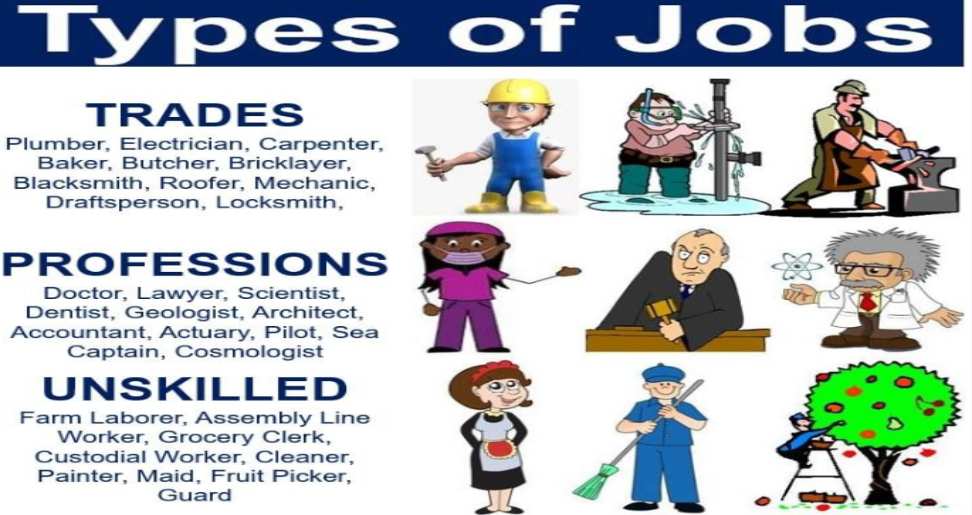A job is a contract between an individual and an organization. The individual provides specific skills, knowledge, and labor in exchange for compensation, benefits, and opportunities for growth. Moreover, a job is a means to an end; it serves as a vehicle for individuals to achieve their personal and financial goals.
Types of Jobs

Here’s a broad classification of different job types:
- Full-Time Jobs: These involve working a standard workweek, typically 40 hours per week. They often offer benefits like healthcare and paid time off.
- Part-Time Jobs: Employees work fewer hours than full-time employees and may not receive benefits.
- Contract Jobs: Temporary positions with a defined end date. They offer flexibility but often lack job security.
- Freelance Jobs: Self-employed individuals who work on a project-by-project basis.
- Remote Jobs: Positions that allow employees to work from home or a remote location.
Categories of Jobs: A Brief Overview

Jobs can be categorized in various ways based on different criteria. Here are some common categories:
Based on Industry
- Technology: Software development, IT support, cybersecurity, etc.
- Healthcare: Doctors, nurses, medical technicians, pharmacists, etc.
- Finance: Accountants, bankers, financial analysts, insurance agents, etc.
- Education: Teachers, professors, counselors, administrators, etc.
- Marketing: Market research analysts, advertising managers, public relations specialists, etc.
- Sales: Sales representatives, account managers, customer service representatives, etc.
Based on Job Function
- Management: Overseeing and coordinating the work of others.
- Creative: Involving artistic or design skills, such as graphic design, writing, or music.
- Technical: Requiring specialized knowledge or skills in a specific field.
- Administrative: Handling office tasks, data entry, and organizational work.
- Customer Service: Interacting with customers to provide assistance and support.
Based on Employment Type
- Full-time: Regular employment with a set number of hours per week.
- Part-time: Employment with fewer hours than full-time.
- Freelance: Self-employed work with flexible hours.
- Contractual: Temporary employment for a specific project or period.
The Importance of a Job

A job is more than just a means to earn a living. It plays a crucial role in an individual’s life and contributes significantly to society.
Financial Stability
- Income Generation: A job provides a steady income to meet basic needs such as food, shelter, and clothing.
- Savings and Investments: Employment enables individuals to save for future goals like education, housing, or retirement.
- Financial Independence: A job empowers individuals to make their own financial decisions.
Personal Growth
- Skill Development: Jobs offer opportunities to learn new skills and enhance existing ones.
- Career Advancement: Progressing in a job can lead to promotions and increased responsibilities.
- Sense of Accomplishment: Achieving goals and overcoming challenges in a job can boost self-esteem.
Social Interaction
- Networking Opportunities: Jobs facilitate building relationships with colleagues and clients.
- Teamwork: Collaboration with colleagues fosters teamwork and communication skills.
- Sense of Belonging: Being part of a workforce can create a sense of community.
Contribution to Society
- Economic Growth: Jobs contribute to the overall economy by generating income and spending.
- Tax Revenue: Employment generates tax revenue, which funds public services.
- Innovation: Jobs stimulate creativity and problem-solving, leading to new products and services.
Challenges of the Modern Workplace

While jobs offer numerous benefits, they also come with their fair share of challenges. Here are some common hurdles faced by employees:
Work-Life Balance
- Overwhelming Workload: Excessive work hours and pressure to meet deadlines.
- Blurred Boundaries: Difficulty separating work from personal life.
- Burnout: Physical and emotional exhaustion due to prolonged stress.
Job Insecurity
- Economic Downturns: Fear of job loss during economic recessions.
- Technological Advancements: Concerns about job displacement due to automation.
- Rapid Industry Changes: Adapting to evolving job requirements.
Workplace Challenges
- Toxic Work Environments: Dealing with negative colleagues or management.
- Lack of Growth Opportunities: Stagnation and limited career advancement.
- Insufficient Compensation: Inadequate salary or benefits packages.
- Work-Related Stress: Dealing with high-pressure situations and demanding workloads.
Personal Challenges
- Lack of Job Satisfaction: Feeling unfulfilled or unmotivated in one’s role.
- Skill Mismatch: Possessing skills that don’t align with job requirements.
- Job Search Difficulties: Challenges in finding suitable employment.
The Evolution of Work: From Factory Floor to Flexible Office

The concept of a “job” has undergone a dramatic transformation throughout history. From the agrarian era to the digital age, the nature of work has evolved significantly.
The Industrial Revolution
The Industrial Revolution marked a pivotal shift, moving labor from farms to factories. Jobs became standardized, with repetitive tasks and rigid work schedules. The assembly line became synonymous with manufacturing, and workers were often seen as interchangeable parts of a larger machine.
The Knowledge Economy
The latter half of the 20th century ushered in the knowledge economy. With the rise of technology, jobs shifted from manual labor to intellectual pursuits. Professions in fields like technology, finance, and healthcare gained prominence. The emphasis shifted from physical output to knowledge creation and innovation.
The Digital Age
The advent of the internet and digital technologies has further transformed the workplace. Remote work, freelancing, and gig economy jobs have become commonplace. The traditional 9-to-5 job is no longer the norm. Flexibility, work-life balance, and skill-based hiring are now key trends.
The Future of Work
As technology continues to advance, the future of work promises to be even more dynamic. Automation and artificial intelligence are expected to automate many routine tasks, creating new job roles that require higher-level skills. The demand for creativity, problem-solving, and adaptability will increase.
The Scope of Jobs in 2024: A Dynamic Landscape

The job market in 2024 is a complex tapestry woven with threads of technological advancement, globalization, and societal shifts. The traditional nine-to-five job is evolving, and new opportunities are emerging at an unprecedented pace.
The Digital Transformation

The most significant influence on the job market is undoubtedly technology. Roles centered around data, artificial intelligence, and digital platforms are in high demand.
- Data Science and Analytics: With the exponential growth of data, professionals skilled in extracting meaningful insights from vast datasets are invaluable.
- Artificial Intelligence and Machine Learning: As AI continues to mature, there’s a rising need for experts to develop and implement AI solutions.
- Cybersecurity: Safeguarding digital assets has become paramount, leading to a surge in demand for cybersecurity professionals.
- Digital Marketing: With the increasing reliance on digital channels, marketers with expertise in SEO, social media, and content creation are in high demand.
Remote Work and the Gig Economy

The rise of remote work has reshaped the traditional workplace.
- Remote Work: The ability to work from anywhere has opened up opportunities for professionals in diverse fields.
- Freelancing and Gig Economy: The gig economy has created a flexible work environment for many, with platforms connecting freelancers with clients.
Sustainability and Green Jobs
Growing environmental concerns have led to a focus on sustainable practices.
- Renewable Energy: Professionals in solar, wind, and hydro power are in demand.
- Environmental Consulting: Experts who can assess environmental impact and develop sustainable solutions are sought after.
- Green Technology: Roles in electric vehicles, energy efficiency, and sustainable agriculture are emerging.
Healthcare and Life Sciences

The aging population and advancements in healthcare technology have created a surge in healthcare jobs.
- Healthcare IT: Professionals who can manage healthcare data and systems are crucial.
- Biotechnology: Research and development in biotechnology offer promising career paths.
- Mental Health Professionals: The increasing emphasis on mental well-being has created demand for psychologists, counselors, and therapists.
Soft Skills Remain Essential
While technical skills are crucial, soft skills like communication, problem-solving, and adaptability remain essential for career success.
The job market in 2024 is characterized by rapid change and new opportunities. To thrive in this dynamic environment, individuals need to be adaptable, possess a strong learning agility, and continuously upskill themselves.
In conclusion,

In summation, the concept of a job is multifaceted and dynamic, evolving in tandem with societal, economic, and technological shifts. Fundamentally, a job serves as a means of exchange, wherein individuals contribute their skills, knowledge, and time in return for compensation, often monetary. However, the implications extend far beyond this basic definition. Jobs are pivotal in shaping individual identities, fostering social connections, and contributing to the broader economic fabric.
Read more:
- Alternatives to Payday Loans: Exploring Your Options
- Maximize Vehicle Longevity: How to Get the Best Service from Your Local Auto Center
- Shooting Star vs Inverted Hammer: Understanding the Key Differences and How to Spot Them
Featured Image source: https://tinyurl.com/bdef6xw3

